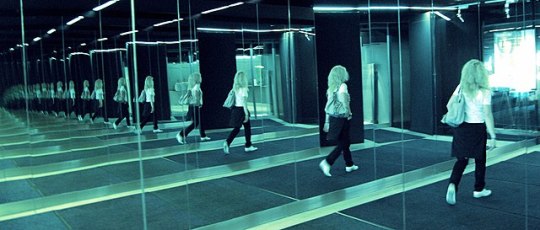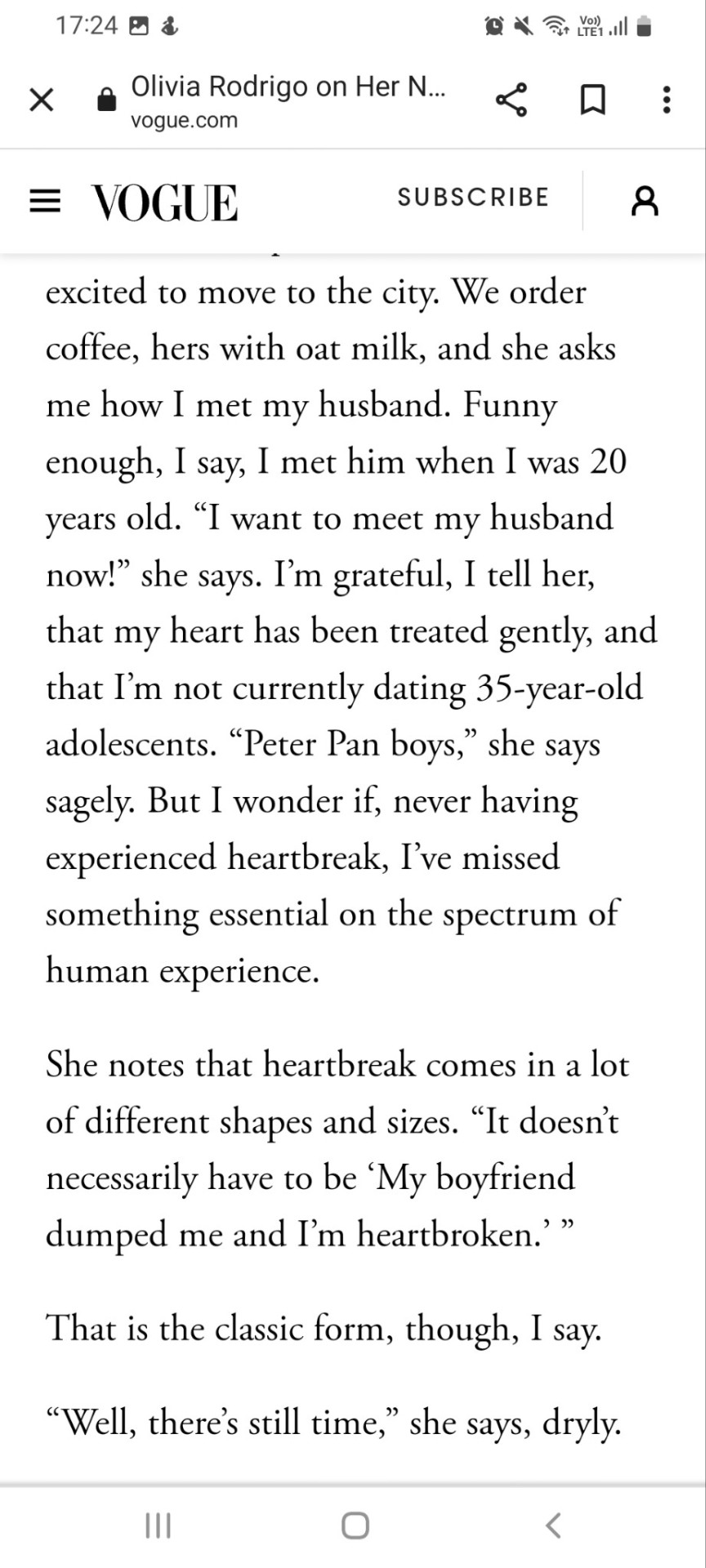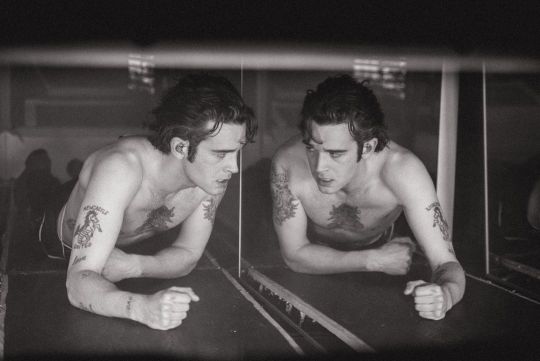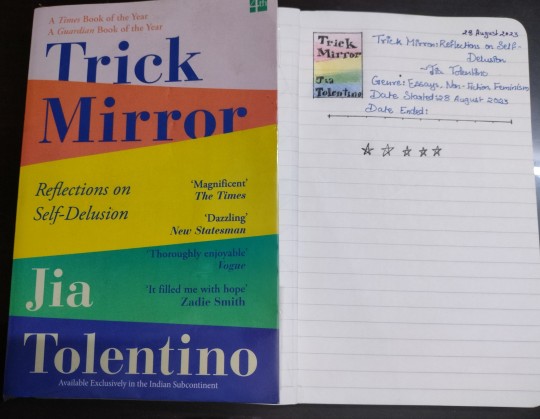#jia tolentino
Text
[Simone de Beauvoir] describes the definitive thrill and sorrow of female adolescence—the realization that your body, and what people will demand of it, will determine your adult life. “If the young girl at about this stage frequently develops a neurotic condition,” de Beauvoir writes, “it is because she feels defenseless before a dull fatality that condemns her to unimaginable trials; her femininity means in her eyes sickness and suffering and death, and she is obsessed with this fate.”
Jia Tolentino, Trick Mirror: Reflections on Self-Delusion
263 notes
·
View notes
Note
I remember everyone was talking about jia tolentino’s instagram face essay as a companion piece to the everyone is beautiful but nobody is horny essay. Have you read it/do you have thoughts on it? Thanks!
i think one of jia tolentino's problems as a writer is that she often seems genuinely unaware of how limited her scope is and how it hampers her efforts to develop any social commentary applicable beyond her socioeconomic milieu. so for example, afaik she's right that a certain plastic surgery look has been popular in recent years with the instagram influencer / model / LA set (w/ some changes over time, like the even more recent popularity of buccal fat removal or that cat-eye facelift situation). but she talks about this as though it's like a universal condition of Modern Womanhood, even after pointing out that it costs a fuckload of money to actually have these procedures done lol. like it's the ig version of how like, legacy media journos are always banging on about what the twitterati think about the latest hbo show. these are like, tiny slices of the population who assume their own experiences are universal because they don't think poor and working class people count the same as them. it's almost funny. anyway i think the most interesting part of the instagram face essay is when she points out that the face in question is often aiming to be white, yet ambiguously 'ethnic'—much to unpack here about beauty standards and the role they play in discourses of racialisation, as well as how they're then shaped by the resultant 'scientific' ideas about phenotypic populations and racial categories. i wish the essay had said more about this. instead it felt like it got stuck on the idea that bodies under neoliberal capitalism are 'assets' to be 'improved' upon—which like, true, but not an entirely new phenomenon and it wasn't an analysis that had much to actually say about capitalism or biopolitics. this is connected to the above issue imo because fundamentally tolentino Doesn't Like Capitalism but also doesn't have much to say about it beyond how it makes Women (a coherent category...) feel.
53 notes
·
View notes
Text
5 Great Essays by Jia Tolentino

The Tyranny of the Ideal Woman by Jia Tolentino - How we became suckers for the hard labor of self-optimization...
Somewhere Worse by Jia Tolentino - We are entering an era not just of unsafe abortions but of the widespread criminalization of pregnancy
The Age of Instagram Face by Jia Tolentino - How social media, FaceTune, and plastic surgery created a single, cyborgian look
Losing Religion and Finding Ecstasy in Houston by Jia Tolentino - Christianity formed my deepest instincts, and I have been walking away from it for half my life
No Offense by Jia Tolentino - The offense is supposed to go somewhere and do something. Of course, in practice, that’s not what happens at all
16 notes
·
View notes
Link
Jia Tolentino's brilliant essay, just shared, links to this scarily powerful piece by evolutionary biologist Suzanne Sadedin, whose framing metaphor implicitly makes the case that women have the right to withdraw from the battle that can and does take such a huge toll, even when not fatal: "When scientists tried to gestate mice outside the womb, they expected the embryos to wither, deprived of the surface that had evolved to nurture them. To their shock they found instead that – implanted in the brain, testis or eye of a mouse – the embryo went wild. Placental cells rampaged through surrounding tissues, slaughtering everything in their path as they hunted for arteries to sate their thirst for nutrients.
It’s no accident that many of the same genes active in embryonic development have been implicated in cancer. Pregnancy is a lot more like war than we might care to admit." Shades of Barbara Kruger's "your body is a battle zone" in a whole new way. And it makes the case that the uterus is a tough organ that exists to, among other things, protect pregnant people against that fury-to-consume with which they're pregnant, and perhaps the struggle to both produce progeny and survive doing so might figure nicely in any future Darwinism.
More from the essay: "A list of the reproductive ills that afflict our species might start with placental abruption, hyperemesis gravidarum, gestational diabetes, cholestasis and miscarriage, and carry on from there. In all, about 15 per cent of women suffer life-threatening complications during each pregnancy. Without medical assistance, more than 40 per cent of hunter-gatherer women never reach menopause. Even with the help of modern medicine, pregnancy still kills about 800 women every day worldwide."
[h/t Rebecca Solnit]
196 notes
·
View notes
Quote
More than twenty years ago, the writer Michael Goldhaber observed, in Wired, that the Internet drowns its users in information while constantly increasing information production; this makes attention a scarce and desirable resource—the “natural economy of cyberspace.” Goldhaber speculated that, when the “attention economy” had matured, nearly everyone would have her own Web site, and he warned readers that “increasing demand for our limited attention will keep us from reflecting, or thinking deeply (let alone enjoying leisure).” In other words, he roughly outlined the social-media age.
Social-media companies monetize everyday selfhood: our preferences and personal data are tracked and sold to advertisers; our relationships are framed as potentially profitable conduits; we continually capture one another’s lucrative attention by performing some version of who we think we are. Over time, we have absorbed these terms and conditions: we might retain very little of the value we create, but we have allowed social media to make us feel valuable. These platforms encourage compulsive use by offering forms of social approval—likes on Facebook and Instagram, retweets on Twitter—that are intermittent and unpredictable, as though you’re playing a slot machine that tells you whether or not people love you. Dependency, eventually, assumes its own logic.
Jia Tolentino, What It Takes To Put Your Phone Away
34 notes
·
View notes
Text

Oh mood
Highlighted text reads : " most of my life is inextricable from the internet, and it's mazes of incessant forced connection - this feverish, electric, unlivable hell"
#image id in alt#ghost.reads#haunted.books#i will have to decide on a tag#look at my pastel highlighters so pretty#trick mirror#Jia Tolentino#quotes#books#bookblr#readblr
11 notes
·
View notes
Text
Women are genuinely trapped at the intersection of capitalism and patriarchy—two systems that, at their extremes, ensure that individual success comes at the expense of collective morality.
— Jia Tolentino, Trick Mirror
#trick mirror#jia tolentino#essays#quotes#literary quotes#literature#writing#books#book#spilled ink#prose#thoughts#lit#love#relationship#asian american#asian lit#asian literature#quote of the day#reverie#reverie quotes#quote#book quote#book quotes#important quote#important quotes#inspiring quote#inspiring quotes#beautiful quote#beautiful quotes
14 notes
·
View notes
Text
A model has to figure out a way to appeal to an unseen, changing audience; she has to understand how to silently invite their desires and needs onto her under pressure, she has to radiate perfect composure and control.
-- Jia Tolentino
3 notes
·
View notes
Text

Also had to reread this Jia piece from a couple of months ago... well there's still time lmao
7 notes
·
View notes
Text

Jia Tolentino x "Who's Afraid of Eating the Rich?" x Chan Centre for Performing Arts x UBC. (via Justin Man)
How Tolentino engages our existence of interlocking contradictions through cultural touchstones makes her writing so clear-headed yet deeply entangled in messiness. Her pivot to wealth, its depictions, and our relationship to it reveals so much about our inner rot and depression. Even defining "rich" is unclear when measured against others and global reach.
#yvr#media#ubc#jia tolentino#speech#talk#new yorker#the new yorker#vancouver#vancity#british columbia#lower mainland#university#college#campus
2 notes
·
View notes
Text

"What do I mean when I say I don't care?" he asked. "What is that apathy I speak of? It's an exhaustion, maybe. The truth is, when I go home, this is not the shit I'm dealing with. I'm not dealing with the crisis of masculinity. I'm dealing with how my mum's feeling, what Ross is going through. I'm trying to be in service to people." He was no longer invested in the project of being publicly correct. "I've done my decade of trying to be that," he said. "I'm more interested in actually being wrong, and people seeing that, and knowing what's right because of it."
May 29, 2023: Matty describes his disinterest in being publicly correct. (source 1, 2)
#year: 2023#may 2023#quote: matty healy#matty's character#matty's values#topic: politics#topic: controversy#get to know them#jia tolentino#source: the new yorker#source: jordan hughes#who is matty healy?
3 notes
·
View notes
Text
What remains from that period is an unyielding and sometimes humiliating awareness of the gap between intentions and actions—and a palpable gratitude for the activities, like sex and cooking, that minimize that gap. It still feels like a miracle that I can walk into a grocery store and purchase nearly anything. That I can go home with a bag of whatever pleases me and make anything I want. What a privilege that is, and what a sense of possibility flows from it. Whenever I lose my sense of cause and effect, I cook.
—Jia Tolentino, “Learning to Make Lasagna in Kyrgyzstan”
14 notes
·
View notes
Text
It's very easy, under conditions of artificial but continually escalating obligation, to find yourself organizing your life around practices you find ridiculous and possibly indefensible. Women have known this intimately for a long time.
Jia Tolentino, "Always Be Optimizing," Trick Mirror: Reflections on Self Delusion
2 notes
·
View notes
Quote
We remain attached to these technologies in a way that is clearly affecting the health of the body politic. Newport insists that our Internet-fuelled lack of mental peace and quiet is a better explanation for the current wave of American anxiety than “the latest crisis—be it the recession of 2009 or the contentious election of 2016.” He cites Virginia Woolf’s case for productive solitude, in “A Room of One’s Own,” the 1929 manifesto in which Woolf explains that a sixteenth-century woman with a gift for poetry would have been a “woman at strife against herself. All the conditions of her life, all her own instincts, were hostile to the state of mind which is needed to set free whatever is in the brain.” Newport writes, “In Woolf’s time, women were denied this liberation by a patriarchal society. In our time, this oppression is increasingly self-inflicted by our preference for the distraction of the digital screen.”
Reading that sentence produced a reaction I often experience when I look at Twitter: first, I burst out laughing, and then I felt sad. Newport, who wrote the books “How to Win at College” and “How to Become a Straight-A Student” before making a philosophical turn, acknowledges that several of the world’s biggest companies now rely on profit models that “reduce autonomy, decrease happiness, stoke darker instincts, and distract from more valuable activities,” but he never identifies as a culprit the ideology that has allowed these profit models to flourish unchecked. He describes smartphones and social media as technologies that seek to exploit you, and, in a chapter titled “Join the Attention Resistance,” he counsels aspiring digital minimalists that they will need a “ruthless commitment to avoiding exploitation.” He does not, however, suggest that exploitation might be actively curtailed rather than merely avoided. Even when comparing social media to cigarettes, he does not mention the possibility of government regulation. These days, and in no small part because of the atomization engendered by social media, it can feel that every last thing has been privatized and individualized. In “Digital Minimalism,” ethics and politics, too, are reduced to the individual: it is not, it seems, the system of power that matters but what you, alone, choose to do about it. “Vive la résistance! ” Newport writes.
Jia Tolentino, What It Takes To Put Your Phone Away
22 notes
·
View notes
Text

Ok, so to keep me reading and to keep me accountable, I'm keeping a book journal! I'll stick to this template for now but I might change it up who knows.
I'm starting Trick mirror by Jia Tolentino
It's an essay collection, and it's said to be very good so let's see how it goes!
#books#bookblr#reading#trick mirror#jia Tolentino#book journal#i will update as i go along#im proud of my mini cover rbh#not bad for a first try
5 notes
·
View notes
Text
The self is not a fixed, organic thing, but a dramatic effect that emerges from a performance. This effect can be believed and disbelieved at will.
— Jia Tolentino, Trick Mirror
#trick mirror#jia tolentino#essays#quotes#literary quotes#literature#writing#books#book#spilled ink#prose#thoughts#lit#love#relationship#asian american#asian lit#asian literature#quote of the day#reverie#reverie quotes#quote#book quote#book quotes#important quote#important quotes#inspiring quote#inspiring quotes#beautiful quote#beautiful quotes
17 notes
·
View notes